
The post Russia To Use “Evil” Cryptocurrency For Foreign Trade; Here’s Why. appeared first on Coinpedia Fintech News
In a surprising move, Russia has turned to cryptocurrency for cross-border settlements and transactions amidst ongoing sanctions following its invasion of Ukraine. The decision to explore this alternative mode of payment has raised eyebrows in the cryptocurrency world and sparked discussions about its potential impact on global trade. Read on for further details.
‘Evil Crypto’ Can Be Used in Foreign Trade Says Alexey Moiseev
During the “Banks. Transformation. Economy. 2.0” conference in Moscow, Russia’s Deputy Finance Minister, Alexey Moiseev, discussed the potential use of crypto assets in certain scenarios, specifically in relation to foreign trade activities that are currently restricted by Western sanctions. Moiseev also highlighted that the State Duma, the lower house of the Russian parliament, is currently considering a draft law to regulate this matter.
As reported by RIA Novosti news agency, Moiseev said, “Of course, crypto is generally evil. I believe that people who invest their savings there take a very big risk … But there may be individual situations in which crypto can be used.”
Experiments for the implementation of crypto transactions underway
Alexey Moiseev stated that experiments would be conducted if the bill was adopted. He explained that a committee, consisting of representatives from several ministries, the Bank of Russia, and law enforcement agencies, would be formed to grant permission to specific operators to use cryptocurrencies in foreign trade transactions.
According to Alexey Moiseev, the legislative procedure required to provide the legal foundation for the trials would probably not start until the year’s end. For a long time, lawmakers and government representatives have been debating various facets of Russia’s regulatory strategy regarding cryptocurrencies.
Cryptocurrency as a Necessity Amid Sanctions: Russia’s Changing Views
As Western sanctions on Russia increased following its invasion of Ukraine, state institutions have recognized the necessity of using cryptocurrency for cross-border settlements. While most decentralized cryptocurrencies are still not legalized for transactions within Russia, they are permitted for international payments under special legal regimes that have yet to be established. This shift in perspective highlights the growing importance of cryptocurrency in the face of geopolitical tensions.

 2 years ago
112
2 years ago
112














 English (US) ·
English (US) ·